| Listing 1 - 7 of 7 |
Sort by
|
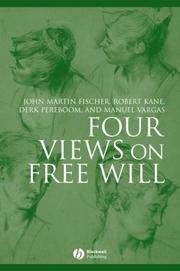
ISBN: 9781405134866 9781405134859 1405134860 1405134852 Year: 2007 Publisher: Oxford Blackwell
Abstract | Keywords | Export | Availability | Bookmark
 Loading...
Loading...Choose an application
- Reference Manager
- EndNote
- RefWorks (Direct export to RefWorks)
Focusing on the concepts and interactions of free will, moral responsibility, and determinism, this text represents the most up-to-date account of the four major positions in the free will debate. Four serious and well-known philosophers explore the opposing viewpoints of libertarianism, compatibilism, hard incompatibilism, and revisionism * The first half of the book contains each philosopher's explanation of his particular view; the second half allows them to directly respond to each other's arguments, in a lively and engaging conversation * Offers the reader a one of a kind, interactive discussion * Forms part of the acclaimed Great Debates in Philosophy series
Philosophical anthropology --- Free will and determinism. --- Libre arbitre et déterminisme --- Free will and determinism --- Libre arbitre et déterminisme --- Compatibilism --- Determinism and free will --- Determinism and indeterminism --- Free agency --- Freedom and determinism --- Freedom of the will --- Indeterminism --- Liberty of the will --- Determinism (Philosophy)
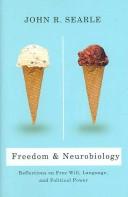
ISBN: 1280598182 9786613628015 0231510551 9780231510554 9781280598180 6613628018 0231137524 9780231137522 Year: 2007 Publisher: New York : Columbia University Press,
Abstract | Keywords | Export | Availability | Bookmark
 Loading...
Loading...Choose an application
- Reference Manager
- EndNote
- RefWorks (Direct export to RefWorks)
Free will and determinism. --- Neuropsychology. --- Power (Social sciences) --- Sociolinguistics. --- Language and languages --- Language and society --- Society and language --- Sociology of language --- Language and culture --- Linguistics --- Sociology --- Integrational linguistics (Oxford school) --- Empowerment (Social sciences) --- Political power --- Exchange theory (Sociology) --- Political science --- Social sciences --- Consensus (Social sciences) --- Neurophysiology --- Psychophysiology --- Compatibilism --- Determinism and free will --- Determinism and indeterminism --- Free agency --- Freedom and determinism --- Freedom of the will --- Indeterminism --- Liberty of the will --- Determinism (Philosophy) --- Social aspects --- Sociological aspects
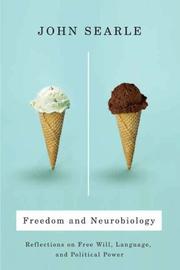
ISBN: 0231137524 9780231137522 Year: 2007 Publisher: New York Columbia university press
Abstract | Keywords | Export | Availability | Bookmark
 Loading...
Loading...Choose an application
- Reference Manager
- EndNote
- RefWorks (Direct export to RefWorks)
Psycholinguistics --- Philosophy of language --- Metaphysics --- Affective and dynamic functions --- Sociolinguistics --- Free will and determinism. --- Neuropsychology. --- Power (Social sciences) --- Sociolinguistics. --- Free will and determinism --- Neuropsychology --- Language and languages --- Language and society --- Society and language --- Sociology of language --- Language and culture --- Linguistics --- Sociology --- Integrational linguistics (Oxford school) --- Empowerment (Social sciences) --- Political power --- Exchange theory (Sociology) --- Political science --- Social sciences --- Consensus (Social sciences) --- Neurophysiology --- Psychophysiology --- Compatibilism --- Determinism and free will --- Determinism and indeterminism --- Free agency --- Freedom and determinism --- Freedom of the will --- Indeterminism --- Liberty of the will --- Determinism (Philosophy) --- Social aspects --- Sociological aspects
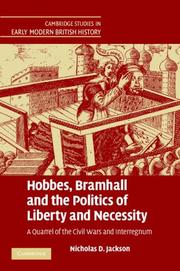
ISBN: 9780521181440 9780521870061 0521870062 9780511495830 9780511355554 0511355556 0511354487 9780511354489 0511495838 1107179750 1281153338 9786611153335 0511353901 1139132555 0511355033 0521181445 Year: 2007 Publisher: Cambridge : Cambridge University Press,
Abstract | Keywords | Export | Availability | Bookmark
 Loading...
Loading...Choose an application
- Reference Manager
- EndNote
- RefWorks (Direct export to RefWorks)
This book was the first full account of one of the most famous quarrels of the seventeenth century, that between the philosopher Thomas Hobbes (1588-1679) and the Anglican archbishop of Armagh, John Bramhall (1594-1663). This analytical narrative interprets that quarrel within its own immediate and complicated historical circumstances, the Civil Wars (1638-49) and Interregnum (1649-60). The personal clash of Hobbes and Bramhall is connected to the broader conflict, disorder, violence, dislocation and exile that characterised those periods. This monograph offered not only the first comprehensive narrative of their hostilities over two decades, but also an illuminating analysis of aspects of their private and public quarrel that have been neglected in previous accounts, with special attention devoted to their dispute over political and religious authority. This will be of interest to scholars of early modern British history, religious history and the history of ideas.
Hobbes, Thomas --- Bramhall, John --- Bramhall, John, --- Free will and determinism. --- Political science --- History --- Hobbes, Thomas, --- Great Britain --- Compatibilism --- Determinism and free will --- Determinism and indeterminism --- Free agency --- Freedom and determinism --- Freedom of the will --- Indeterminism --- Liberty of the will --- Determinism (Philosophy) --- Bramble, --- Bramhell, --- Branhall, John, --- Author of The vindication of the clergy, --- Vindication of the clergy, Author of the, --- Derrie, --- John, --- Bramhall, --- Bromwell, John, --- Londonderry, --- Gobbs, Tomas, --- Hobbs, Thomas, --- Gobbes, Tomas, --- T. H. --- H., T. --- Hobs, Thomas, --- Hobbes, --- Hobbes, Thom. --- Hobbius, Thomas, --- Hobbuzu, Tomasu, --- Huobusi, --- Hobbs, Tho. --- הובס, תומס, --- 霍布斯, --- ホッブズ, トマス, --- Arts and Humanities
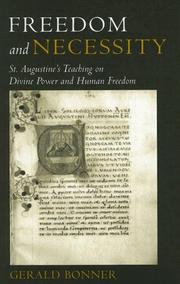
ISBN: 0813215870 9780813215877 0813214742 9780813214740 Year: 2007 Publisher: Washington, D.C. Catholic University of America Press
Abstract | Keywords | Export | Availability | Bookmark
 Loading...
Loading...Choose an application
- Reference Manager
- EndNote
- RefWorks (Direct export to RefWorks)
Predestination --- Free will and determinism --- Grace (Theology) --- Compatibilism --- Determinism and free will --- Determinism and indeterminism --- Free agency --- Freedom and determinism --- Freedom of the will --- Indeterminism --- Liberty of the will --- Determinism (Philosophy) --- Salvation --- Law and gospel --- Foreordination --- History of doctrines --- Religious aspects --- Christianity --- Augustine, --- Avgustin, --- Augustinus, Aurelius, --- Augustyn, --- Augustin, --- Ughasṭīnūs, --- Agostino, --- Agustí, --- Augoustinos, --- Aurelius Augustinus, --- Augustinus, --- Agustín, --- Aurelio Agostino, --- Episkopos Ippōnos Augoustinos, --- Augoustinos Ipponos, --- Agostinho, --- Ōgostinos, --- Agostino, Aurelio, --- אוגוסטינוס הקדוש --- أغسطينوس، --- 奥古斯丁 --- Augustinus, Aurelius --- Agostinho --- Augustine of Hippo --- Augustine d'Hippone --- Agostino d'Ippona --- Augustin d'Hippone --- Augustinus Hipponensis, sanctus --- Sant'Agostino --- Augustinus van Hippo --- Aurelius Augustinus --- Aurelio Agostino --- 聖アウグスティヌス --- アウグスティヌス --- Augustine

ISBN: 9780813214740 0813214742 Year: 2007 Publisher: Washington (D.C.) Catholic university of America press
Abstract | Keywords | Export | Availability | Bookmark
 Loading...
Loading...Choose an application
- Reference Manager
- EndNote
- RefWorks (Direct export to RefWorks)
Aurelius Augustinus (354-430), bishop of Hippo Regius (the modern Annaba in Algeria), is considered one of the outstanding thinkers in Western Christian civilization, Catholic and Protestant alike. Particularly influential has been his pessimistic doctrine of divine predestination, which holds that only a small proportion of humanity has been selected by God for salvation, while the overwhelming majority, including all unbaptized persons, are damned. Yet, paradoxically, Augustine’s exposition of the Eucharistic unity of the elect in the Body of Christ, his Christology, and his emphasis on love as the principal mark of the Godhead have provided a pattern for Christian devotion and spirituality down through the ages. This book seeks to explain this paradox in Augustine’s theology by tracing how these different emphases arose in his thought, and speculating as to why he endorsed, in the end, his theology of predestination. The book is intended not only for students of theology and church history, but even more for readers attracted to Christian doctrine. Written in straightforward language, it supplies adequate references to original sources for those wishing to further pursue the subject. The author, a historian turned theologian, has studied Augustine for more than sixty years and seeks neither to extenuate nor to condemn him, but to depict his thought. His book will prove fruitful for all who engage it This is a comprehensive and well-argued book that manages concisely to summarize disputed questions concerning Augustine’s alleged incapacity to reconcile divine omnipotence and human free will. Both students of Augustine’s thought and general readers will find Gerald Bonner’s brief study extremely helpful in understanding the paradoxical nature of Augustine’s thought regarding predestination and human freedom as well as the relevance of his style (rhetorical rather than systematic, especially during his debates with the Pelagians), the role of his sources in shaping Augustine’s view, and the differences between his early and late writings. With respect to divine predestination, these differences in Bonner’s view are clearly marked (43–44, 118), by Ad Simplicianum (396), which concentrates on explaining 1 Corinthians 4.7 and which is regarded by Augustine himself in his De praedestinatione sanctorum (428/9) and De dono perseverantiae (428/9) as a statement of his mature theology. Bonner insists that Augustine here ceases to acknowledge any role for human initiative in salvation and that Ad Simplicianum actually concludes a process which had developed in the bishop’s work for several years (43–44). If until 394 Augustine maintained that God gives grace to those whose future faith he foresees, later he insisted against the Pelagians that free choice for good requires the gift of a special grace, necessary for the fallen human condition and greater than the one of creation (68–69). The Pelagians are themselves theologically and historically reconsidered by Bonner, who seeks to offer an impartial view of the controversies between them and Augustine. He explains that while their error was an overestimation of the human capacity for free choice after the Fall in an attempt to defend human responsibility (ix), Augustine’s approach was an attempt to belittle human free will since he was more interested to defend divine omnipotence against Manichean dualism. Consequently, for Bonner, neither is Pelagianism such a shallow theology as its critics maintain, nor is Augustine’s predestinarian theology a doctrine of the universal Church (125). Furthermore, although Bonner warns against an overestimation of Augustine’s theory of grace and maintains that the bishop’s eucharistic theology or his emphasis on divine love and Incarnation are equally important (ix, 2), he also observes that the flaws in Augustine’s theology regarding predestination and free will actually appear in the entire Western theology, most especially in Calvin, and they arise from an emphasis on the theory of creation ex nihilo and on its consequences (21–24). Accordingly, beyond its obvious benefit of doing away with the Manichean dualism, this theory inspired by neoplatonic thought was itself the source of numerous problems since it made humans absolutely dependent on God and accentuated God’s wrath toward the disobedient. Moreover, beyond the theory of creation ex nihilo, Augustine borrowed from the neoplatonists the concepts of participation (metousia, metochē), of the restoration of the image of God lost by humans because of the Fall (30–31, 51–52, 61–62), and of the insubstantiality of evil, which is only a privation of goodness (71, 111). And if in Sermon 192, while commenting upon Galatians 4.5, Augustine extended the neoplatonic concept of participation towards a special union between humans and God, a deification (theosis) effected by divine adoption (51, 62), this view was not to endure. Later, Augustine maintained that after Adam’s Fall all that humans deserve is damnation since all created things exist only by participating in God, and once they cease to participate, they lose their existence (51–52). It is only God’s mercy that makes him chose a few elect to be saved (47). And here the neoplatonic inspiration is itself abandoned, and Augustine emphasizes divine grace (26) since in the system he constructed the regeneration of human beings and their return to God can be initiated only by God, who becomes human through Christ and restores human nature by sharing in it (53). Bonner makes it clear, however, that human free will is thus still denied and divine omnipotence and providence (pronoia) (22) emphasized. Since God does not crown human merits but his own gift of grace (67, 81), Augustine’s philosophy seems incapable.
Grace (Theology) --- Free will and determinism --- Grâce (Théologie) --- Libre arbitre et déterminisme --- History of doctrines --- Religious aspects --- Histoire des doctrines --- Aspect religieux --- Augustine, --- Predestination --- Salvation --- Law and gospel --- Compatibilism --- Determinism and free will --- Determinism and indeterminism --- Free agency --- Freedom and determinism --- Freedom of the will --- Indeterminism --- Liberty of the will --- Determinism (Philosophy) --- Foreordination --- Christianity --- Avgustin, Blazhennyĭ, --- Augustinus, Aurelius, --- Augustyn, --- Augustin, --- Ughasṭīnūs, --- Agostino, --- Agustí, --- Augoustinos, --- Aurelius Augustinus, --- Augustinus, --- Agustín, --- Aurelio Agostino, --- Episkopos Ippōnos Augoustinos, --- Augoustinos Ipponos, --- Agostinho, --- Aurelli Augustini, --- Augustini, Aurelli, --- Aurelii Augustini, --- Augustini, Aurelii, --- Ōgostinos, --- Agostino, Aurelio, --- אוגוסטינוס הקדוש --- أغسطينوس، --- 奥古斯丁 --- Avgustin, --- Augustinus, Aurelius --- Agostinho --- Augustine of Hippo --- Augustine d'Hippone --- Agostino d'Ippona --- Augustin d'Hippone --- Augustinus Hipponensis, sanctus --- Sant'Agostino --- Augustinus van Hippo --- Aurelius Augustinus --- Aurelio Agostino --- 聖アウグスティヌス --- アウグスティヌス --- Augustine --- Augustine, - Saint, Bishop of Hippo
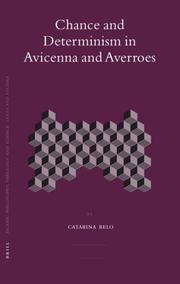
ISSN: 01698729 ISBN: 9789004155879 9004155872 9786611917159 128191715X 9047419154 9789047419150 Year: 2007 Volume: 69 Publisher: Leiden Boston Brill
Abstract | Keywords | Export | Availability | Bookmark
 Loading...
Loading...Choose an application
- Reference Manager
- EndNote
- RefWorks (Direct export to RefWorks)
This book examines the question whether medieval Muslim philosophers Avicenna (Arabic Ibn Sīnā 980-1037) and Averroes (Arabic Ibn Rushd 1126-1198) are determinists. With a focus on physics and metaphysics it studies their views on chance events in nature, as well as matter, in particular prime matter, and divine providence. In addition it sets their positions against the historical/philosophical background that influenced their response, the Greco-Arabic philosophical tradition - Aristotelian and Neoplatonic - on the one hand, and the tradition of Islamic theology ( kalām ) on the other. In comparing their philosophical systems, it lays emphasis on the way in which Avicenna and Averroes use these traditions to offer an original answer to the problem of determinism.
Free will and determinism --- Philosophy, Islamic. --- Religious aspects --- Islam. --- Avicenna, --- Averroës, --- Determinism (Philosophy) --- Chance. --- Déterminisme (Philosophie) --- Hasard --- Averroës, --- Islamic philosophy --- Arabic philosophy --- Muslim philosophy --- Philosophy, Islamic --- Philosophy, Arab --- Compatibilism --- Determinism and free will --- Determinism and indeterminism --- Free agency --- Freedom and determinism --- Freedom of the will --- Indeterminism --- Liberty of the will --- Religious aspects&delete& --- Islam --- Al-Hosain ben Abdallah ben Sînâ, Abou Alî --- Avicenna Latinus --- Avicenne --- Avicene --- Ibn Sīnā, al-Husayn ibn 'Abd Allāh --- Al-Hoessein Ibn Abdoellah Ibn Sînâ, Abou Alî --- Abū al-Walīd ibn Rushd, --- Abū al-Walīd Muḥammad ibn Aḥmad ibn Rushd, --- Abū el-Walīd ibn Roshd, --- Abuʼl-Walid Muhammad bin Rusjd, --- Alṿalid ibn Rushd, --- Averroè, --- Averróis, --- Bin Rusjd, Muhammad bin Ahmad, --- Ibn-e-Rushd, --- Ibn-i Rushd, --- Ibn Rashad, --- Ibn Rochd, --- Ibn Roshd, Abū el-Walīd, --- Ibn Roshd, --- Ibn Ruschd, --- Ibn Rušd, --- Ibn Rushd, --- Ibn Rushd al-Ḥafīd, --- Ibn Rushd, Abū al-Walīd, --- Ibn Rushd, Abū al-Walīd Muḥammad ibn Aḥmad, --- Ibn Rushd, Abul Walid Muhammad ibn Ahmad, --- Ibnu Rosjid, --- Ibnu Rusjd, --- ابن رشد، --- Muḥammad ibn Aḥmad ibn Rushd, --- Avicenna --- Free will and determinism (Islam) --- Islamic philosophy. --- Free will and determinism - Religious aspects - Islam. --- Avicenna, - 980-1037. --- Averroës, - 1126-1198.
| Listing 1 - 7 of 7 |
Sort by
|

 Search
Search Feedback
Feedback About
About Help
Help News
News